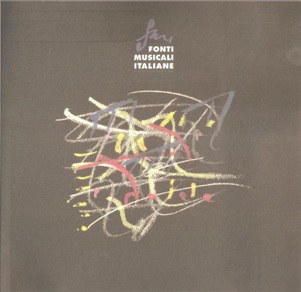Nuove fonti dall’officina di Ottaviano Petrucci*
Abstract
L'articolo illustra la recente scoperta di due frammenti appartenenti a due diverse stampe di Ottaviano Petrucci: il primo, che si trova nell'Archivio di stato di Fano, consiste nelle cc. 5r/v-6r/v della parte di Tenor de I motteti dal fiore stampati nel 1538; il secondo, conservato nell'Archivio di stato di Pesaro, contiene le cc. 5r/v-6r/v di una ristampa della parte di Altus della messa Mente tota di Antoine Févin presumibilmente del 1521, secondo Stanley Boorman. Il foglio di Fano contiene i seguenti mottetti: In convertendo con la sua seconda parte Qui seminant Dominus di Lupus Hellinck, Inviolata, integra et casta es Maria con la sua seconda parte O benigna di Jean Courtois, e Pater noster di Adrian Willaert. L'importanza di questo ritrovamento consiste nel rendere più consistente la recente scoperta di alcuni frammenti de I motteti dal fiore segnalata recentemente in «Early Music» (cfr. Gialdroni- Ziino, New light on Ottaviano Petrucci's activity, 1520-38. An unknown print of the Motteti dal fiore, «Early Music», XXIX/4, 2001, pp. 501-532), il che conferma e rafforza le ipotesi che in quella sede erano state avanzate riguardo la dipendenza di questa ultima stampa petrucciana dalla omonima raccolta di Jacques Moderne pubblicata a Lione nel 1532. Il foglio di Pesaro contiene il Gloria, il Credo e il Sanctus della messa Mente tota inserita nella stampa delle Messe di Févin edite per la prima volta a Fossombrone il 22 novembre 1515. Stanley Boorman ha individuato, di questa edizione, almeno altre due ristampe, l'ultima delle quali (alla quale dovrebbe appartenere il nostro frammento) risalirebbe presumibilmente al 1521. Le circostanze relative alla trasmissione di questo foglio – molto simili a quelle con cui ci sono pervenuti i tre frammenti relativi ai Motteti dal fiore – ci hanno indotto a ipotizzare anche per questa ristampa di Févin una datazione più recente rispetto a quella proposta da Boorman, comunque successiva al 1521.
******New sources from Ottaviano Petrucci's printing house
This article illustrates the recent discovery of two fragments of two different printings by Ottavio Petrucci: the first, in the State Archives of Fano, consists in the cc. 5r/v-6r/v of the tenor part of I motteti dal fiore printed in 1538 and the second, in the State Archives of Pesaro, contains the cc. 5r/v-6r/v of a reprint of the Altus part of Antonio Févin's Mass Mente tota presumably of 1521, according to Stanley Boorman. The Fano document includes the following motets: In convertendo with its second part Qui seminant Dominus of Lupus Hellinck, Inviolata, integra et casta es Maria with its second part O benigna of Jean Courtois, and Adrian Willaert's Pater noster. The importance of this find lies in its rendering more consonant the recent discovery of some fragments of I motteti dal fiore recorded in «Early Music» (see Gialdroni-Ziino, New light on Ottaviano Petrucci's activity, 1520-38. An unknown print of the Motteti dal fiore, «Early Music», XXIX/4, 2001, pp. 501-532), which confirms and strengthens the hypotheses that were advanced on that occasion relative to the dependence of this last Petrucci printing from the homonymous collection of Jacques Moderne published at Lyon in 1532. The document of Pesaro contains the Gloria, the Credo and the Sanctus of the Mente tota Mass included in the publication of Févin's Messe printed for the first time at Fossombrone on 22 November 1515. Stanley Boorman has identified at least two other reprints of this edition, the last of which (to which our fragment would belong) dates back presumably to 1521. The circumstances pertinent to the transmission of this sheet, very similar to those through which the three fragments relative to I motteti dal fiore have reached us, have led us to assume also for this reprint of Févin a more recent dating than that proposed by Boorman, and at any rate subsequent to 1521.
##submission.downloads##
Pubblicato
Fascicolo
Sezione
Licenza
© CIDIM
Tutti i diritti riservati


